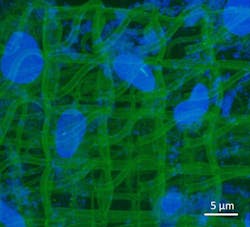Grant to help develop 3D printer, processes for dermal regeneration
Microlight3D (Grenoble, France), which manufactures high-resolution microscale 2D and 3D printing systems for industrial and scientific applications, is a partner in the regenerative medicine project nAngioDerm, which has been selected for funding in the amount of €747,000 ($822,000). A consortium of research agencies from several countries will distribute the European funding—among them ANR, the French National Research Agency (Paris, France), which will underwrite Microlight3D's participation.
nAngioDerm falls within the scope of EuroNanoMed3 (2016-2021), which supports multidisciplinary and translational research and innovation projects covering regenerative medicine, diagnostics, and targeted delivery systems, under the European Horizon 2020 program.
Microlight3D, one of five European partners collaborating on the nAngioDerm project, will contribute to bringing a solution to patients whose wounds from ulcers or major burns fail to heal. The partners will develop a new process and new products involving ion-release biomaterials, which will promote angiogenesis for dermal regeneration. This demands skilled competencies in tissue engineering, bioactive ions, and cell-scaffold 3D printing.
Microlight3D will develop a 3D printer and process dedicated to cell-scaffold application—a structure used in tissue engineering that provides support, enabling living tissue to regenerate itself and facilitate healing.
The lead partner, the Institute for Bioengineering in Catalonia (IBEC; Barcelona, Spain), will be responsible for bringing its research capacity in bioactive ions and bioengineering to the nAngioDerm project and coordinating the contributions of the other partners: the University of Ioannina (Ioannina, Greece), the Universitario Vall d’Hebron Hospital (also in Barcelona), the University of Grenoble, and Microlight3D.
Microlight3D's selection was based on its ability to develop 3D printers that can print into biomaterials with sub-cellular resolution and precision.
Work on the project starts in September 2019 and will run for 36 months.
For more information, please visit microlight.fr.
